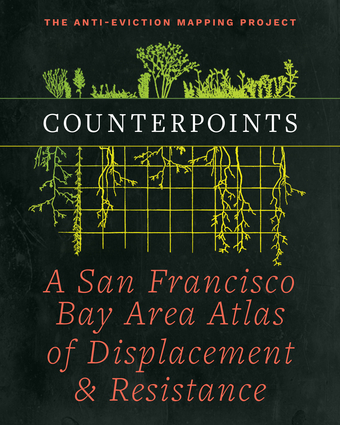Overview
A collaborative, co-created atlas aimed at expanding knowledge on displacement and resistance in the Bay Area with, rather than for or about, those most impacted
Counterpoints brings together cartography, essays, illustrations, poetry, and more in order to depict gentrification and resistance struggles from across the San Francisco Bay Area and act as a roadmap to counter-hegemonic knowledge making and activism. Compiled by the Anti-Eviction Mapping Project, each chapter reflects different frameworks for understanding the Bay Area's ongoing urban upheaval, including: evictions and root shock, indigenous geographies, health and environmental racism, state violence, transportation and infrastructure, migration and relocation, and speculative futures. By weaving these themes together, Counterpoints expands normative urban-studies framings of gentrification to consider more complex, regional, historically grounded, and entangled horizons for understanding the present. Understanding the tech boom and its effects means looking beyond San Francisco's borders to consider the region as a socially, economically, and politically interconnected whole and reckoning with the area's deep history of displacement, going back to its first moments of settler colonialism. Counterpoints combines the work of community partners, longtime community members who have fought waves of racial dispossession, and youth envisioning decolonial futures.Reviews
"This collection literally makes visible intersecting lines of structural violence that produce displacement and dispossession, while also tracing creative resistances that are always challenging these processes and building more just futures. As an atlas, Counterpoints is transformative and inspiring—it refuses the knowledge making and representational practices that bind cartography to settler colonialism and racial capitalism, instead developing ethical cartographies and collective praxes for mapping otherwise." —Sarah Elwood, professor of geography, University of Washington, author of Relational Poverty Politics: Forms, Struggles, Possibilities "Counterpoints: A San Francisco Bay Area Atlas of Displacement and Resistance is a politically urgent and timely account of the historical and present-day forces of dispossession and resistance in the Bay Area. The atlas contains a wide-ranging archive that assembles the Anti-Eviction Mapping Project's maps and oral histories, accounts of struggles around eviction, movements for environmental justice, histories of migration, and indigenous geographies produced by scholars, activists, journalists, and residents of the Bay Area. As a counter-cartography that is deeply rooted in community knowledge and struggle, this groundbreaking text makes visible the places and people that Google maps and real estate speculators erase. This book is a must read not just for those living in the Bay Area, but for all those interested in countering the spatial violence induced by racial capitalism." —Neda Atanasoski, professor of feminist studies, University of California, Santa Cruz; author of Surrogate Humanity: Race, Robots, and the Politics of Technological Futures "Counterpoints is a necessary counterpoint to the cheerleaders for the Age of Tech in the San Francisco Bay Area. The people have suffered mightily as their city has been turned upside down by boomtown madness, bloated by unconscionable wealth, invaded by global capital and strangled by real estate speculation. The admirable activists at the Anti-Eviction Mapping Project have used their collective geographical imaginations to lay bare the facts of displacement, the resulting social upheavals and the people's struggles to reclaim their rights to the city." —Richard Walker, Professor Emeritus of Geography, University of California, Berkeley "The Anti-Eviction Mapping Project's work is inspiring for activist cartographers and mapping activists in a series of ways: its strategic use of maps to accuse the manifold forms of oppression in neoliberal urbanization; its commitment to local communities and underrepresented spatial subjectivities; and its involvement with multiple (artistic) measures of activist action. This atlas, we believe, has the potential to instigate social justice struggles in cities worldwide." —kollectiv orangotango, author of This is Not an Atlas "The Anti-Eviction Mapping Project has long been one of the best examples of what's possible when digital mapping, oral history, community organizing, and public art join forces against displacement. With Counterpoints, they're providing not just a comprehensive look at land and organizing in the Bay Area, but also a new collection of ideas, tools and examples for housing organizers and counter-cartographers across the country. This book proves that mapping can be so much more than merely the science of princes and shows the stunning possibilities of what happens when communities and social movements wrest the power of mapping from states and corporations." —Counter-Cartographies CollectiveAuthor Biography
The Anti-Eviction Mapping Project is a data visualization, critical cartography, and multimedia storytelling collective that documents displacement and resistance struggles on gentrifying terrains. Chris Carlsson is a writer, San Francisco historian, "professor," bicyclist, tour guide, blogger, photographer, and book and magazine designer. Ananya Roy is a professor of urban planning, social welfare, and geography and the Meyer and Renee Luskin Chair in Inequality and Democracy at UCLA, where she is the inaugural director of the Institute on Inequality and Democracy.

